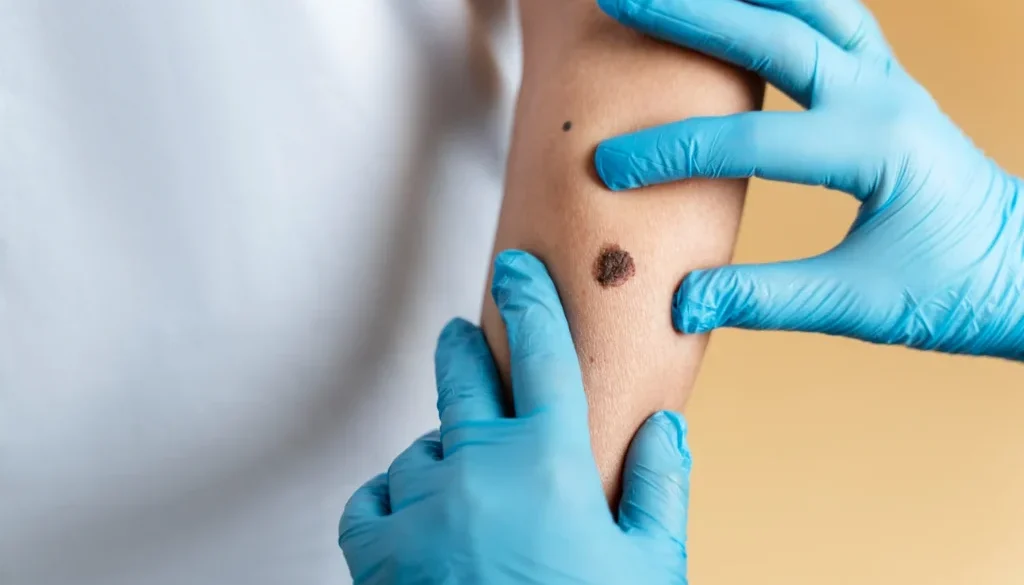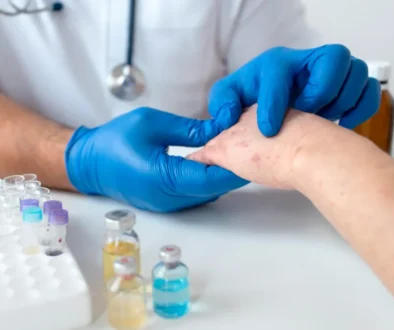Wart Removal in Sharjah
Treating Warts: More Than Just Bumps on Your Skin
Warts are harmless, small growths on the skin triggered by the human papillomavirus (HPV). They can appear anywhere on the body but are commonly found on the hands, feet, and face. While warts are generally harmless, they can be unsightly, uncomfortable, and occasionally painful. Understanding warts, their symptoms, types, causes, and treatments is crucial for managing and preventing these bothersome growths. At Lifeline Clinic in Sharjah, we offer comprehensive wart treatments and removal services. Led by Dr. Jayaram Illikkal, a general practitioner, our team provides expert care to effectively address skin warts. With our advanced treatments and personalized approach, we strive to help you achieve clear and healthy skin.
What is a Wart?
A wart is a small, rough growth resembling a cauliflower or a solid blister. Warts result from an infection by HPV, which penetrates the skin through minor cuts or abrasions. The virus stimulates the rapid proliferation of cells on the outer skin layer leading to the formation of a wart.
Symptoms of Warts
Warts vary in appearance depending on their type and location. Common symptoms include:
- Small, grainy skin growths.
- Flesh-coloured, white, pink, or tan bumps.
- Rough to the touch.
- Black pinpoints, which are small, clotted blood vessels.
Types of Warts
- Common Warts (Verruca Vulgaris): Usually found on the hands and fingers, these warts have a rough, grainy appearance and may contain black pinpoints.
- Plantar Warts: Manifest on the soles of the feet and may cause discomfort due to their location. They often grow inward, creating a thick callus over the wart.
- Flat Warts (Verruca Plana): Smaller and smoother than other warts, these often appear on the face, thighs, or arms.
- Filiform Warts: Long and narrow, these warts typically appear on the face, neck, or eyelids.
- Periungual Warts: Found around the nails, these warts can affect nail growth and are more common in people who bite their nails or pick at hangnails.
Causes of Warts
Warts are caused by an infection with one of the many types of HPV. The virus is spread through coming into direct contact with a wart or objects that have touched a wart such as towels or surfaces. Elements that elevate the likelihood of developing warts include:
- Damaged skin.
- Weakened immune system.
- Use of communal showers or swimming pools.
- Direct contact with someone who has warts.
Common Wart Treatments
Many warts disappear on their own over time, but treatments can speed up the process and alleviate discomfort. Common wart treatments in Sharjah for wart removal include:
Over-the-counter medications: These topical treatments containing salicylic acid work by gradually deteriorating the tissue of the wart.
Cryotherapy: This method entails using liquid nitrogen to freeze the wart to destroy the infected cells.
Electrosurgery: This treatment uses an electrical current to remove the wart.
Laser therapy: Lasers can target and vaporize the wart tissue.
Cantharidin: This blistering agent applied by a doctor can cause the wart to separate and fall off.
When to See a Doctor
While many warts can be treated at home, there are situations where you should see a healthcare provider:
- If the wart becomes painful or undergoes alterations in appearance.
- Home treatments are not effective.
- The wart spreads or recurs frequently.
- The wart is in a sensitive area, such as the face or genitals.
- You have a weakened immune system.
Preventing Warts
Utilizing prevention techniques can lower the likelihood of wart occurrence:
- Avoid touching warts, whether they belong to you or someone else.
- Avoid sharing personal belongings like towels, razors, or footwear to minimize the spread of warts.
- Keep feet dry and change socks daily.
- Wear flip-flops in communal showers or around pools.
- Do not bite your nails or pick at hangnails.
- Maintain good hand hygiene.
Risks Associated with Warts
Although warts are generally harmless, they can sometimes lead to complications:
- Spread of Warts: Warts can spread to other parts of the body or other people.
- Infection: An injured wart can become infected, leading to more severe skin problems.
- Discomfort: Warts on weight-bearing areas, like the soles of the feet, can cause pain and difficulty walking.
Warts are a common skin condition, but with proper knowledge about causes and treatment, you can effectively get rid of them. Remember, early diagnosis and treatment are key. While many warts resolve without intervention, a healthcare provider should evaluate persistent or problematic warts based on causes. If you have concerns about a wart, don’t hesitate to reach out to our doctor in Sharjah for wart removal. By taking preventive measures and employing effective treatments, you can minimize the impact of warts on your life.
Frequently Asked Questions
ARE WARTS CONTAGIOUS, AND HOW DO THEY SPREAD?
- Yes, warts are contagious. They spread through direct skin contact and contact with contaminated objects.
HOW LONG DO WARTS LAST, AND DO THEY GO AWAY ON THEIR OWN?
- Warts can last from a few months to a couple of years. They often go away on their own but can persist longer without treatment.
HOW DO DOCTORS REMOVE WARTS?
- Doctors can remove warts using cryotherapy (freezing), cantharidin (blistering agent), laser treatment, or surgical removal.
DO WARTS LEAVE SCARS?
- Warts themselves usually do not leave scars, but treatments like surgical removal or aggressive home treatments can sometimes cause scarring.
CAN WARTS COME BACK AFTER TREATMENT?
- Yes, wart can recur after treatments if the HPV virus remains in the skin. Recurrence is common and may require additional treatment.


